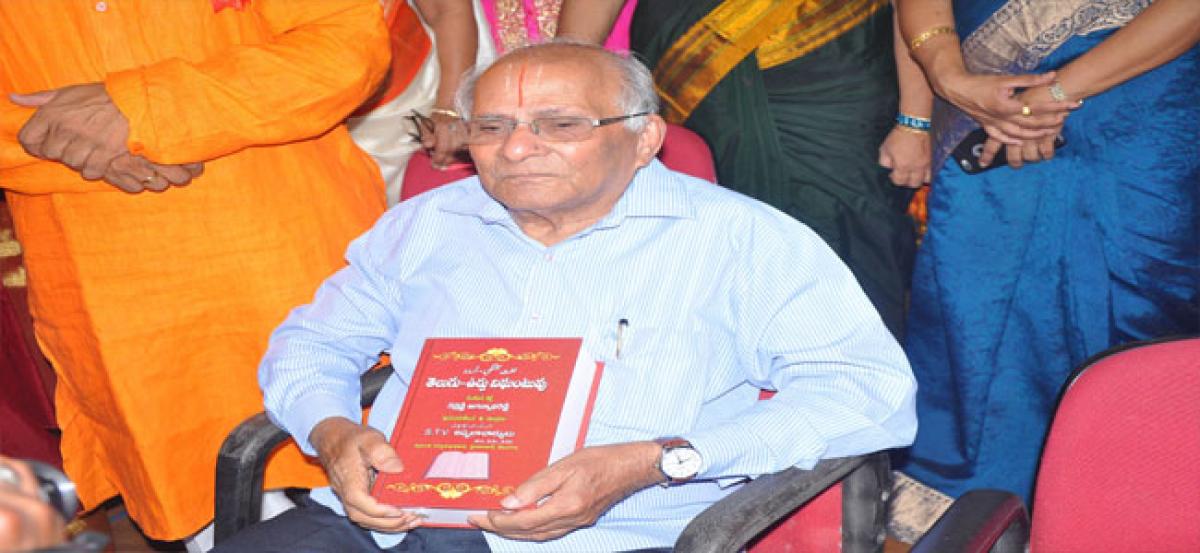Live
- Prisoner in Sangareddy Central Jail Suffers Heart Attack
- Targeting gut cells may open new way to reduce depression & anxiety
- ‘Daaku Maharaaj’ to kickstart musical promotions
- ‘Game Changer’ team teases with a new promo
- Nara Lokesh emphasises overhaul of govt. schools and mid-day meal program
- Amid turmoil, air pollution peaks in Bangladesh as temperatures fall
- Google Trends unveils list of most searched ‘Indian Movies of 2024’
- BGT 2024-25: Hazlewood signals readiness for Brisbane Test after training with full run-up
- Google Presents Deep Research AI Tool for Comprehensive Web Reports
- Share of top 50 stocks to total market cap at all-time low: Report
Just In

After successfully completing his earlier endeavour by translating ‘Srimad Bhagavad Gita’ in Urdu and coming up with a Telugu-Urdu Nighantuvu (Dictionary), the nonagenarian and cancer survivor, S T Venkata Appala Chari has a new venture up his sleeves ‘The essence of Quran and Bhagavad Gita’.
Hyderabad: After successfully completing his earlier endeavour by translating ‘Srimad Bhagavad Gita’ in Urdu and coming up with a Telugu-Urdu Nighantuvu (Dictionary), the nonagenarian and cancer survivor, S T Venkata Appala Chari has a new venture up his sleeves ‘The essence of Quran and Bhagavad Gita’.
Perhaps one of the few scholars from Nizam’s era who kept alive the Urdu language in their hearts, Venkata Appala Chari is currently staying in Kenya along with his elder son and remains enchanted to the Urdu language. In 2017, he had transformed a raw compilation of an author whose paperwork was stored for more than 60 years into a beautiful Telugu to Urdu dictionary through his industry of three-and-half years. The editing of this ‘Nighantuvu’ was one of the tedious tasks, but he continued to finish while recuperating from health-related issues.
It did not stop him from undertaking some more work towards bridging the Telugu and Urdu through his translation works. Currently staying far away from the mother land, Appala Chari has now began reading Quran in Urdu to know its essence and to find its commonalities with that of Bhagavad Gita. Even it does not feel like hard task, as he already has translated Srimad Bhagavad Gita, under the name ‘Naghme Ilahi’. “Since both religious scriptures are important, I hope to provide bridge between the two by identifying common aspects and highlighting them so that people easily understand their essence,” he said in a video call from Nairobi (Kenya).
Retired in 1988, as Assistant Director of School Education, later he compiled SCERT books, took psychology and methodology classes to MA (TPT) and never stopped till he tackled cancer in 2006. After being getting treated he authored, Naghme Ilahi (translation of Srimad Bhagavad Gita into Urdu), which brought him back into limelight for his piece of work. Later, he pondered since the raw dictionary ‘compilation’ he had received decades ago helped him, he began focusing on its translation too. His second, S T Srinivasa Chary, Lay Secretary & Treasurer, JSPS, Government Homeo Medical College (Ramanthapur) backed his efforts. “He studied in Urdu when the language had prominence. I hope that if his health supports, the new task will also be a reality in the coming days,” said Srinivasa Chary.
Appala Chari owes his penchant and knowledge of Urdu to his school teacher, Khadar Hussain Khan, who called him ‘111’ while referring to Vaishnavait symbols drawn on forehead. His son recalls, when Appala Chari went to meet his ‘Ustad’ in his old age, he was unable to recognise him, then he referred himself as ‘111’, prompting his outburst and tears rolled out of his eyes.
Some of the copies of Telugu-Urdu dictionary which was released in 2017 by Legislative Council Chairman, K Swamy Goud and Deputy Chief Minister Md. Mahmood Ali in Telugu University still remain with his son Srinivasa Chary. Interested candidates may contact him on 9849403933.
BY Md Nizamuddin

© 2024 Hyderabad Media House Limited/The Hans India. All rights reserved. Powered by hocalwire.com







